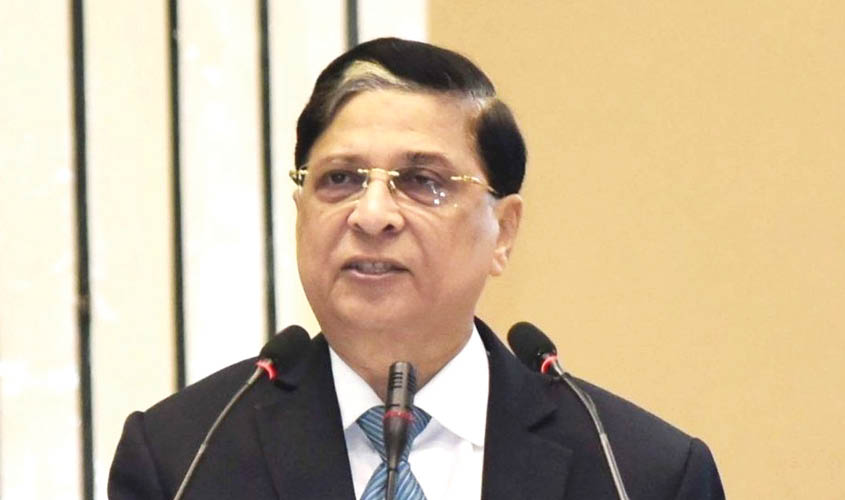Expectations that Chief Justice of India Dr Dipak Misra would be able to dispense justice by authoring landmark judgements in his last days in the high office have finally turned true.
Last fortnight, judgement after judgement was pronounced by the Supreme Court on many important and sensitive cases that were hanging fire for quite some time. In these very columns, The Sunday Guardian had run reports on how lobbies were burning their midnight oil to thwart or twist the process of justice in extremely sensitive cases (Efforts multiply to delay Ram Mandir verdict indefinitely, 21 July 2018). This newspaper had also expressed its hope that the incumbent Chief Justice of India, Dr Dipak Misra would be able to author landmark verdicts on so many cases of national and social import within a short time he is left with before he hangs his boots (16 days left for CJI Misra to create judicial history, 9 September 2018). And yes, those expectations have come out true and Justice Misra has finally pulled it off to create a judicial history of sorts.
Among the slew of verdicts various Benches headed by Justice Misra have delivered in the last two weeks, the three most significant ones are on Ayodhya, Aadhaar and Bhima-Koregaon cases. Delivering the long reserved judgement in the all-important case of Ram Janmabhoomi-Babri mosque title suit, the three-judge Bench of Justices Misra, Ashok Bhushan and S. Abdul Nazeer dismissed the petitioners’ request to refer to a larger Bench for review a 24-year-old verdict of Allahabad High Court that mosque was not essential to Islam, with Justice Nazeer giving a dissent note.
In a please-all judgement, the five-judge Constitution Bench headed by Justice Misra pronounced the Aadhaar Act constitutionally valid. In a verdict that was hailed by all the stakeholders—the government, the opposition and the public at large—but barring private entities, the Bench struck down its mandatory linkage to availing mobile connection and benefits of welfare schemes or opening a bank account. Though it made linking Aadhaar to PAN and filing IT returns mandatory, it struck down Section 57 of the Act denying private parties power to ask for Aadhaar. Two judges, however, wrote separate notes.
After initial flip-flops, the three-judge Bench of Justices Misra, A.M. Khanwilkar and D.Y. Chandrachud hearing the “Urban Naxal” case finally refused to interfere in the arrest of five activists charged with plotting to kill Prime Minister Narendra Modi, triggering Bhima-Koregaon violence and having links with outlawed Naxal outfits. It also declined to constitute a special investigating team (SIT) for conducting an independent probe. Stating that the accused have no right to choose investigating agency, it gave freedom to Maharashtra police to proceed against them as per law. In his dissent note, Justice Chandrachud however dubbed it as an attempt to muzzle dissidence.
Other important cases in which judgements have come up under his leadership within this period are: allowing women’s entry into Sabarimala temple, decriminalising homosexuality and adultery, asking the legislature to decide the electoral future of politicians facing criminal cases, allowing lawmakers to practise law, allowing the live telecast of the proceedings of the Apex Court, restraining reservation in promotion, acquittal of the accused scientists in the ISRO espionage case and referring the Dawoodi Bohra female genital mutilation issue to a Constitution Bench in support of the petitioner.
The pace with which verdicts came in his last days in the high office shows Justice Misra’s sincerity, dedication and professionalism towards conducting his duty as the highest judicial functionary of the country. The urgency with which he went on solving the cases, it proved his commitment towards dispensing justice before it was too late. He understood the fact that if he did not close the cases before remitting office, the litigants would have to go through the gruelling legal process all again and the nation and society would have to wait for a long time before finally getting justice.
Apart from this, Justice Misra conducted himself in a very impartial and professional manner while going about naming his successor, despite the fact that the incoming CJI had led an internal rebellion by four fellow judges against him. He rather chose to buy peace and make a graceful exit by successfully overcoming the bitterness and displaying exemplary large-heartedness, personal integrity and strong will-power to maintain the long established tradition of handing over the reins to the next senior-most judge.
Moreover, Justice Misra will go down in the annals of judicial history of the country for the manner in which he took the impeachment bid in his stride and went about his business unfazed. He will also be remembered for a long time to come as one of the boldest CJIs for his daring moves like holding the midnight hearing of Mumbai serial blasts convict Yakub Memon’s plea to stop his execution as well as landmark judgements in cases like Nirbhaya and Padmavat. No doubt, Justice Misra has left behind a rich legacy of judicial values for all the future CJIs to learn and emulate.

